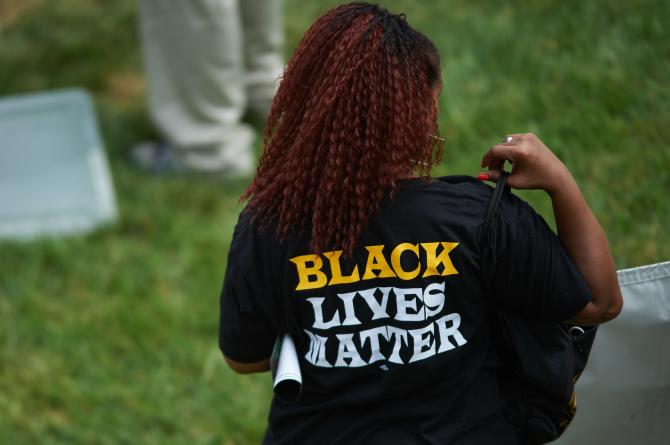Those interested in the reasons for black oppression by the state may conclude that it adds to the corporate bottom line.

Woman at August memorial service for 18-year-old Michael Brown Jr., in Ferguson, Missouri. Photo by Michael B. Thomas / AFP / Getty Images.
As a jack-of-all-trades writer and 50-year political activist, I’ve spent a lot of time on, and put a lot of thought into, propaganda; all of which, as Bob Dylan sang, “is phony.”
Propaganda includes slogans, songs, graphic images, educational and/or advertising materials, and/or deeds that compel those who see, hear, study, or witness them to consider certain aspects of “reality” in a fresh light. Successful propaganda opens closed minds. Its “phoniness” often derives, in my experience, from its perishability. A meaningful and compelling slogan in one context or season often loses its punch as circumstances change (e.g., “I Like Ike“). You have to have something to put into those opened minds, or they eventually wander.
It has forced us to take a closer look at systematic violence towards Black people in the U.S.
I am an old white lady and nobody has to hear me, but I’ma say this anyway: the “Black Lives Matter” movement, with a slogan for a name, has achieved great success as propaganda. It has forced seasoned peace and justice activists of all ethnicities to take a closer look at systematic violence towards Black people in the U.S.; compelled those who argue quite correctly that “all lives matter” to see that Black lives are more routinely disrupted and destroyed by the state itself; and has perhaps opened a new chapter in race relations.
I would suggest, however, that both adherents of Black Lives Matter and the well-intentioned people who debate with them, in order to achieve any actual change, must investigate the basic question of why, in an age of such seeming progress in racial harmony in many areas, Black people continue to be a special focus of state oppression.
For an analogy, we may look to women’s so-called liberation. While parity with men has been achieved in many ways, and U.S. women may now even serve as frontline troops, the 30% “gender gap” between men’s and women’s pay hasn’t budged since “women’s” and “liberation” first started talkin’ to each other.
The reasons for this are economic, and seemingly endemic to capitalism if not to other economic systems; here are just two: (1) women’s unpaid, unrecognized domestic labor underwrites and subsidizes all other productivity; and (2) cheating women of equal pay allows corporations to pad their profits.
Since it is the basic task of the capitalist state to protect corporations (“the people,” according to the Supreme Court), don’t look for any official actions mandating equal pay for equal work.
Without inequality, there are no profits to be had.
Without inequality, there are no profits to be had, or do you believe in Magick?
Those who are truly interested in the reasons for continuing Black oppression by the state, and who investigate with open minds, may conclude that such oppression also adds to the corporate bottom line, in some similar and some divergent ways. Those who are truly interested in the reasons that Mexico and much of Latin America continue to be marginally failed states, fueling immigration to el Norte and thus a higher “crime” rate among Latinos may also find dinero at work.
This is not intended to be a comprehensive list of population groups that might benefit from undertaking such analyses. The changes needed to end oppression for all people, then, may become clearer, although the means to those changes cannot now be foreseen.
I applaud the new generation of young Black, Latina/o, GLBT/O, and other social justice activists who are standing up for the rights to life, liberty, and the pursuit of happiness. I am moved to joy by their solidarity with each other, their rejection of ignorant prejudice, their increasingly caramel-colored diversity, and their fusions of music, food, art, and life.
Like everyone who tries to spark change, they will make mistakes.
Like everyone who tries to spark change, they will make mistakes; Dr. King made mistakes; Hidalgo and Morelos made mistakes; Gandhi made mistakes; even me and my peeps, the “60s generation,” for sure made mistakes, but kept on trying. The point is, keep your analysis current. Respond to the daily tides but always steer for the goal: peace, freedom, and justice for all, in equal measure.
“Black Lives Matter” has forced liberal, progressive, and religious people, at least, to hear that “the problem” has not been remedied when communities live in fear of paid public protectors, when 70% of Black men are caught up somehow in the “justice” system in any given year, when Black women’s pay is even more unequal than that of other women.
There is an underlying problem here. It must be named, studied, understood, and dismantled, and it will take everyone under its thumb to take it apart. Now, without abandoning what has brought the issues of Black lives center stage, it’s time to take the next step, a step perhaps foreshadowed by the intensive study groups that have formed around some local groups of the Occupy movement.
Ask “Why?“; then find out. (And, don’t forget to “Smash the State!”)
Austin, Tejas, Aztlán
3 October 2015
Read more of Mariann Wizard’s writing on The Rag Blog.
[Rag Blog contributing editor Mariann G. Wizard, is an Austin-based writer and activist. Her website is www.Wordsworth.biz.. ]

















